In with the new!
That would be more appropriate for next week's New Year's Eve post, but so be it. I needed to make the change now.
What's in a name? • Chess960, Chess 960, C960, FRC, Fischer Random Chess, Fischerrandom, Fischerandom, 9LX, Freestyle, Fullchess, Shuffle Chess
In with the new!
That would be more appropriate for next week's New Year's Eve post, but so be it. I needed to make the change now.
At the time of the previous FWFRCC event -- see [2019] FWFRCC Wrapup (December 2019) for a summary -- there was some talk of organizing it every two years. Sorry I can't give an exact reference, but COVID upset whatever plans were intended. I closed that '2019 Wrapup' post saying,
Dare we call the tournament the first FWFRCC? Will there be a second? Let's have a big round of applause for the many people who played a role in making the event possible.
Now we can ask, 'Will there be a third?' And let's repeat that 'big round of applause'. The live, commentated finals constituted some of the best chess viewing I've witnessed, and my experience goes all the way back to the 1972 Fischer - Spassky match.
***
Later: After I wrote the post, I recalled a previous post on my main blog that sheds some light on that last sentence; see The Man Who Put Chess on Television (May 2012; Shelby Lyman).
Hikaru v. Nepo Final + Can Carlsen Win A Medal? Fischer Random World Championship (6:10:36) • 'Streamed live on Oct 30, 2022'
The description said,
Chess stars Hikaru Nakamura and Ian Nepomniachtchi are competing to become the Fischer Random world champion! The 2022 Fischer Random World Championship is an over-the-board event in Reykjavik, Iceland. Magnus Carlsen also takes on Nodirbek Abdusattorov on the final day of competition!
A link in the description went to 'Oct 29, 2022 - Oct 31, 2022' Fischer Random World Championship Finals 2022 (chess.com). For more from Youtube's Chess.com channel, see:-
The last link leads to the same video shown in the embedded stream above. The last two streams featured commentary by GMs Naroditsky and Hess. I haven't (yet) watched the first three streams to confirm if the same pair commentated all five. In the final post from last month 2022 FWFRCC Follow-ups (October 2022), I wrote,
This past week I managed to watch a few hours of the 2022 FWFRCC group stage. I was amazed by the quality of the games and of the commentary.
I should mention that I watched on the Youtube channel for Chess24. Here's a list of live streams from the same channel [FWFRC = FIDE World Fischer Random Championship]:-
From what I've seen so far, my preferred chess960 commentator has to be Peter Leko. Hungarian GM Leko was one of the earliest practitioners of chess960 and rubbed shoulders with Fischer when the eccentric American GM lived in Hungary. For a previous post on an early high profile match, see 2001 Leko - Adams on Geocities (May 2022).
This past week I managed to watch a few hours of the 2022 FWFRCC group stage. I was amazed by the quality of the games and of the commentary. Unfortunately, I won't be able to write about the winner until the next scheduled post on this blog next month.
The official announcement of the winner -- 'Hikaru Nakamura is the 2022 FIDE World Fischer Random Champion' -- is shown below.
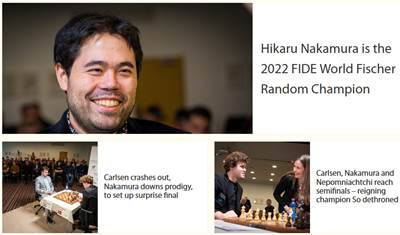
Source:
FIDE Fischer Random World Chess Championship 2022
frchess.com
-or-
fischerrandom.fide.com
The event was covered by all of the major chess news sites. Let's follow the action on FIDE's own site. All of these stories, plus many more, are also available on the official site(s):-
GM Tisdall has emerged as one of the leading authorities on C960/FRC. For the previous post on this blog, see Chess960 Movers and Shakers (November 2020). As for GM Nakamura, he has been mentioned so many times on this blog that he deserves his own category. Since that's not likely to happen anytime soon, use the search box in the right navigation column. Congratulations on his impressive success in the 2022 FWFRCC!
The previous post on this blog was 2022 FWFRCC Qualifiers (October 2022). One of the bullets said, '2022-10-07: Lichess Qualifiers Send Nakamura and Abdusattorov to [WFRC]'. GM Nakamura, a popular Twitch and Youtube streamer, recorded his qualification games. Here is the first clip.
Hikaru on Lichess Fischer Random World Champs Qualifier (1:13:57) • '[Published on] Sep 13, 2022'
The video description informed,
Hikaru plays in a qualifier on Sept 11, 2022 held on Lichess for the Fischer Random World Championship being held in Iceland in October. This is the first qualifier, the top 15 will play on Sept 18th in a knockout format. This is part 1. Hikaru recorded this off stream.
That was the first of three videos on Youtube's GMHikaru channel. All of them received viewer comments numbering around low three figures. Here are the videos:-
The eight player group stage of the 2022 FWFRCC was played this past week. Nakamura was one of four players to qualify into the semifinal stage.
In a recent post on my main blog, Chess960 Mania (October 2022), I discussed Google News chess stories for the month of October. For only the third time since I've been following Google News, the tech giant supplemented the 100 chess stories with a special 'Full Coverage' page. This time the coverage was about the 2022 FWFRCC. In that post I promised, 'to cover the FWFRCC final on [my chess960 blog], incorporating Google's 'Full Coverage' into the next post.' So here we are.
The following image was developed for the 'Chess960 Mania' post. The left chart shows news sources that had more than a single story in Google News for October. I discussed these in that original post.
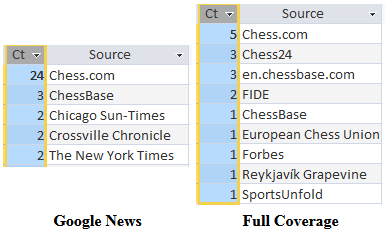
The right chart shows all news sources that had at least one story in the Google 'Full Coverage' section. In other words, 18 stories about 2022 FWFRCC were published by nine different sources (there were also four tweets from Twitter). Five of the stories were from Chess.com. Another five were from sources that accounted for a single story.
Did I say 'nine different sources'? For some reason that isn't immediately clear, ChessBase appears twice in the list. In all fairness I should discuss the five Chess.com stories. The site has been a strong supporter of chess960 since a few years after Chess.com's inception in 2007. It developed software and tools to play chess960 and promoted them through its forums. Two of the four 2022 FWFRCC qualifying events were organized by Chess.com.
For most of that same time ChessBase has been antagonistic to chess960. A few years ago, in Purported Problems with Chess960 (April 2018), I took issue with a long list of chess960 'problems' assembled by ChessBase founder and front man Frederic Friedel. The original ChessBase article is still available on ChessBase.com and undoubtedly still influences people wanting to know more about Fischer's greatest invention.
Here are the four Chessbase stories flagged by Google's 'Full Coverage'. All are from Chessbase.com; the last three are signed by Carlos Alberto Colodro.
Has ChessBase changed its colors? Its tune? You be the judge.
This past week I managed to watch a few hours of the 2022 FWFRCC group stage. I was amazed by the quality of the games and of the commentary. Unfortunately, I won't be able to write about the winner until the next scheduled post on this blog next month, but I can already say to the organizers and to others involved in producing the event, 'Congratulations on a great show and thanks!'
Chess.com Qualifier 1 [chess.com; FRWC = Fischer Random World Championship]:-
Chess.com Qualifier 2 [chess.com]:-
Lichess [lichess.org; WFRC = World Fischer Random Championship]:-
Here's the same infographic I assembled for the 'Finalists' post. The info above matches the second row below.
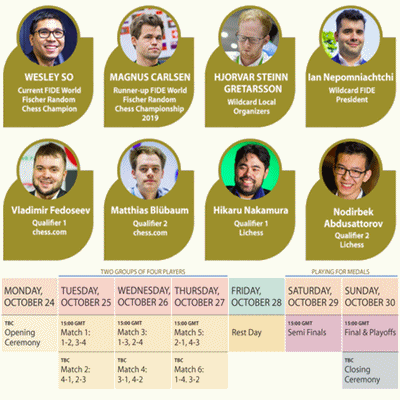
The two Chess.com qualifiers have already finished. I'll save the details for another post.
Once again, I'm going to kick the can down the road. There is more pressing news to report and I don't have time to cover everything in one post. From Magnus Carlsen to headline FIDE World Fischer Random Chess Championship 2022 (chessdom.com):-
FIDE World Fischer Random Chess Championship over-the-board final will take place in the Berjaya Reykjavik Natura Hotel, Iceland, from 25-30 October 2022.
The following image combines two important pieces of info from that article -- the participants and the schedule.

The participants are already known, which means that all of the qualifiers have taken place. Once again, 'I'll save the details for another post.'
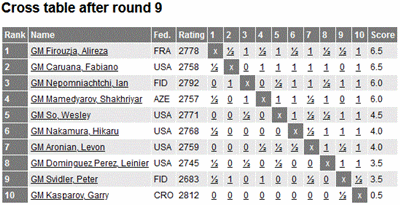
2022 Champions Showdown: Chess 9LX
(uschesschamps.com; see 'Pairings & Results')
That link is to the home page for the event. It explains,
What is Chess 9LX? • Chess 9LX is a tournament hosted by the Saint Louis Chess Club. It is played in the Chess 960 or Fischer Random format. Created by Bobby Fischer in the late 1990s, Chess 960 shuffles the pieces on the home rank, with 960 representing the number of possible starting positions. Players will not know the order of the home rank until 15 minutes before each round.
So who won, Alireza Firouzja or Fabiano Caruana? A press release informed, Fabiano Caruana Wins the 2022 Champions Showdown: Chess 9LX(TM) Tournament (businesswire.com):-
Saint Louis-based Grandmaster Fabiano Caruana was crowned the winner of the 2022 Champions Showdown: Chess 9LX after defeating Alireza Firouzja in Armageddon during their rapid playoff match and taking home the $31,250 first prize.
The following video starts at the point of the rapid playoff match. It first explains the playoff rules and the disposition of the prize fund.
2022 Champions Showdown | Chess 9LX: Day 3 (5:05:39; starts with playoff at 3:43:00) • 'Streamed live on Sep 16, 2022'
For the full Youtube videos on channel 'Saint Louis Chess Club' (SLCC) of all three playing days -- '2022 Champions Showdown | Chess 9LX', streamed live -- see:-
For this blog's final report on last year's event, see Chess940 in 'Chess Life' (December 2021; 'Earlier this year I covered the '9XL Showdown' event in two posts'). To close this current post, I'll add my usual reminder that the SLCC uses non-standard position numbering propagated by Chessgames.com. To convert to the standard position numbering used everywhere else, see Chess960 Start Position Converter for Chessgames.com (m-w.com). Somewhat curiously, the SLCC got it right for the position used in the first two tiebreak games, SP878 is the same start position (QRKRNBBN) in both numbering systems.
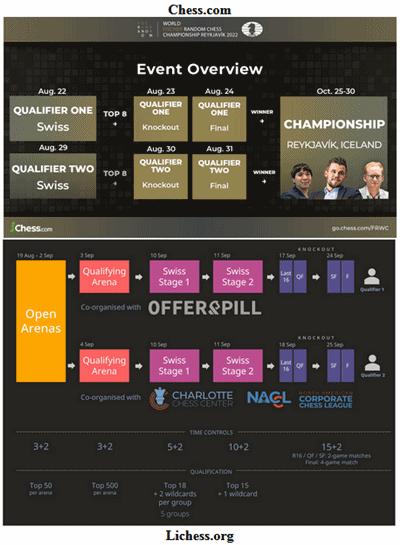
Top:
Fischer Random World Championship 2022 - Info
(chess.com)
•
Bottom:
FIDE World Fischer Random Championship – Update
(lichess.org)
Both Chess.com and Lichess will qualify two players into the championship stage. From the Chess.com page:-
Championship [25-31 October 2022]:-
- Four qualified players join the four invited players.
- The players compete in a group stage, followed by the semifinals and finals
- Group Stage [...] The top-two players from each group advance to the semifinals
- Semifinals and finals [...] Players compete in four-game matches
Location: Qualifiers are played online on Chess.com [and Lichess], while the final is an over-the-board event in Reykjavik, Iceland.
The two Chess.com qualifiers have already finished. I'll save the details for another post.
This post is more of a followup to last month's TCEC C960 FRC5 (July 2022), because it's also about the TCEC. It's in reference to a post on my main blog, Stockfish Wins TCEC DFRC1, Leads CCC18 Rapid Final (August 2022). As a summary of DFRC1, I wrote,
In DFRC1 ('Double Fischer Random Chess: (960*960) possible starting positions'), Stockfish and LCZero finished tied for 1st/2nd places with 16.0/22, 1.5 points ahead of KomodoDragon, which was 2.0 points ahead of Stoofvlees. In the 50 game final match, Stockfish beat LCZero 29.5-20.5 (+18-9=23). For more discussion of the event, see the next post on my chess960 blog.
I know, this isn't the 'next post' on this blog; it's the 'next+1 post'. The unexpected news about the FWFRCC took priority. To understand what the TCEC accomplished -- and it's without question a noteworthy accomplishment -- let's quote some TCEC !definitions [Warning! : Serious chess engine jargon ahead...]:-
!dfrc • Double Fischer Random Chess: The same as Fischer Random Chess [FRC; C960], except the White and Black starting positions do not necessarily mirror each other. Double FRC has 921,600 (960*960) possible starting positions. [Also has links to files for DFRC 'Openings' and 'Evals'.]
!dfrctest • Initial test of !DFRC at TCEC. To check a) engines handling of DFRC - see !bugs, b) some DFRC start positions, c) cutechess handling of DFRC, d) GUI handling of DFRC. Time control: 7 minutes + 1 second/move. Duration 1 week
!dfrc1 • 1.SF (on SB 196) 2.Lc0 (SB 192.5) 3. KD. 26 participants (FRC5 + Bagatur), Swiss format, games from starting positions, 11 rounds, and 30min+3s TC. Estimated duration: 12 days.
!bookdfrc • Selected 1600 opening positions for the DFRC event, and for the DFRC testing. These are the positions for which KD, Eth, Berserk and SF (the latter through dbcn) agree that white has about a 50% chance for a win. The selection was then further pruned using careful SF analysis.
!unbust • Took positions where starting position abs(eval) >= 2.00, 17739 DFRC positions. Played Stockfish 202206020749 200k vs Stockfish 100k and 8071 were still 'busted'. Played those 1M vs 100k and 1172 were left 'busted'. Played those 10M vs 100k and 83 were left 'busted'. Finally, those 100M vs 100k and 10 are still 'busted'. These will be used in Bagatur vs Stockfish bonus.
!chess324 • A subset of DFRC where the Kings and the Rooks are at the usual starting position. Since castling is standard, this allows all engines to play.
For more about that last definition, see Chess324 (talkchess.com; lkaufman, aka Larry Kaufman of Komodo++ fame). The dean of chess engines explained, 'The Kings and Rooks are placed on their normal positions. All the other pieces for White and Black are placed randomly, with no symmetry requirement, the only restriction being that for each side the Bishops must be on opposite colored squares.'
Chessbase weighed in on a related topic with Double Shuffle Chess: a fun variant against Fritz Online (chessbase.com; Albert Silver). In this variant the Kings aren't required to be between the Rooks and there is no castling. No thanks, I'll pass. Maybe the TCEC or the CCC will give it a try.
After that little detour, let's get back to the TCEC. For archive info (crosstables, PGN, etc.) about the DFRC1 events, see:-
Since I'm already following the TCEC, I'll keep an eye on their DFRC events. My first impression is that it's more for chess engine enthusiasts than for chess960 enthusiasts, but I was no fan of chess960 when it first appeared on my radar either.
'[A] Fischer Random championship will be broadcasted by the end of October. [reddit.com]' • That's great news indeed. I hope we'll be hearing more about the event soon. The Reddit post suggests that the event will be held in Iceland.
As I often do, I interjected a note of caution:-
There's nothing to prevent anyone from touting a chess960 tournament as a 'World Championship'. [...] Let's see how the Icelandic organizers justify their event as a World Championship.
This month it's a reality. The justification as a World Championship is solid as a rock:-
The event is spread over multiple sites/venues:-
Note that the three announcements use three different names for the event -- the corresponding acronyms are FWFRCC, FFRWCC, and FWFRC -- so take your pick. I'll pick FWFRCC, which was the acronym I used for the 2019 event:-
All three announcements use the same banner/logo for the event, so I assume it's as official as these things get.

The Lichess announcement includes details about the organization of the event, which is already underway on their site. Chess.com introduces the details on a separate page, Fischer Random World Championship Finals Knockout 2022 (chess.com; Oct 25 - Oct 31), which starts in a few days on their site.
Are the rules consistent across Lichess and Chess.com? Experience says, 'Probably not', but we'll find out for sure as the event unfolds. I'm looking forward to everything!
The site then launched FRC5, which is currently in the four engine 'Final League' stage (KomodoDragon is missing).
The 'Final League' served as a qualification event for the two engine 'Final Match'. The following chart shows the crosstables for both of the 'Final' events, which have completed.
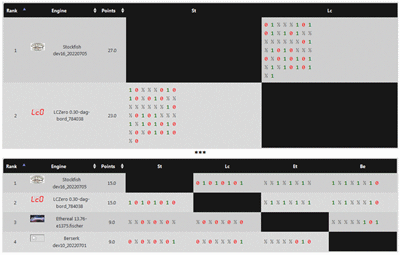
Top: Final Match
Bottom: Final League
In the 'Final League', Stockfish and LCZero finished in a tie for 1st and 2nd to qualify for the 'Final Match'. That result came about after they tied their individual mini-match +4-4=0 and crushed the two last-placed engines in their other mini-matches. In the 'Final Match' Stockfish beat LCZero +17-13=20.
As for the remark, 'KomodoDragon is missing', the other member of the current engine triumvirate was eliminated at the semifinal stage. Through a specific combination of first and second place finishes in the groups of the preliminary stage, all three engines played in the same four-engine semifinal group. LCZero finished a half point ahead of Stockfish, which was a full point ahead of KomodoDragon, thereby eliminating KomodoDragon. For more about the specifics of the competition, see:-
An important section of the rules is worth highlighting:-
4. Openings books
a. All matchups until the Semileagues stage will be played from a randomly generated FRC aka Chess960 start position.
b. For the Semileagues, the Final League and the Final a shallow book will be used.
What does 'shallow book' mean? I couldn't find an explanation on the TCEC Wiki, but the site's !commands inform,
!mob • MOB - Minimalistic Openings Book made by Kan. The idea is to leave lots of choice to the engines and be as shallow as possible while providing an optimum of variety.
I imagine that definition was developed for the traditional start position SP518 and has been reused for chess960. My post on the previous event, TCEC C960 FRC4 (January 2022), looked at TCEC practices for chess960 opening books. To adapt a phrase from that post,
The researcher behind the 'shallow' analysis should make available his full analysis showing which positions were eliminated for which reasons.
That FRC4 post also referenced a couple of my own 'Iceberg' posts (November 2021) analyzing engine runtime data from TCEC FRC3. Add FRC5 to the backlog of events for this sort of analysis.
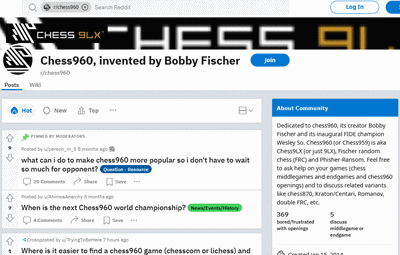
Chess960, invented by Bobby Fischer
(reddit.com)
That snapshot of the current home page includes two excellent pinned questions:-
The answer to that second question includes news from '16 days ago':-
Next 9LX World Championship: The Fischer Random championship will be broadcasted by the end of October. The FRC will also mark the anniversary of the 1972 WCC Fischer - Spassky.
That's great news indeed. I hope we'll be hearing more about the event soon. The Reddit post suggests that the event will be held in Iceland.
There's nothing to prevent anyone from touting a chess960 tournament as a 'World Championship'. The last legitimate claimant to the title was the event I covered last month in FWFRCC PGN (June 2022), held in 2019 and won by Wesley So. Let's see how the Icelandic organizers justify their event as a World Championship.
That table should allow me to identify the individual game scores. The games from later stages are more important than those from earlier stages.
The first important stage, 'Qualifying Stage 3: Knockout Qualifier Phase [Q3]', consisted of six knockout (KO) events, each with 16 strong players. Let's look more closely at the first KO event [KO1], which was reported in Nepomniachtchi Qualifies For FIDE World Fischer Random Chess Championship (chess.com; 13 August 2019).
Each of the 15 KO1 matches had at least two games (some had more). Three of those games were embedded in the Chess.com news article. Embedded games have an 'analysis' icon (lower left) that opens an analysis window, which in turn has a 'share' icon (lower right) that displays the PGN, permitting its download. That's fine for embedded games, but what about the other games?
Each player on Chess.com has a profile page. For example, the winner of 'Q3-KO1' has a page titled
GM Ian Nepomniachtchi (lachesisQ) - Chess Profile
(chess.com). The profile pages lead to a page 'Chess Opening Explorer & Database', initialized for that player. Unfortunately, a help page
How do I use the Game Explorer?
(support.chess.com), informs,
Currently, the Explorer does not index Live Chess games shorter than 5|0, Chess960 games, or any games of fewer than four moves in length.
Fortunately, the site offers an API which is documented in Published-Data API (chess.com). For GM Nepomniachtchi, all of his Chess.com games are available via lachesisq/games/archives. One of the entries there is lachesisq/games/2019/08, i.e. the month when 'Q3-KO1' was played. The FWFRCC chess960 games are mixed in with other games that Nepomniachtchi played that month, but these could be separated.
We seem to have all the pieces to build a database of 2019 FWFRCC PGN game scores. It would be a non-trivial job to gather all of the games, but it should be possible.
***
Later: Strike everything that's misleading! Re '"Chess Opening Explorer & Database" initialized for that player', I overlooked a checked option under 'Live Games' named 'All Live Types'. Uncheck that and check 'Live Chess 960' instead. For GM Nepo's games in 'Q3-KO1', the result is lachesisQ's Games (8).
It would still be a non-trivial job to gather all of the games, but nevertheless a lot easier than my original suggestion. There's no need to get into the weeds for '[player]/games/archives'. The Chess.com interface works great.
2019-11-23: 2019 FWFRCC Final Live • 'First question: where are the game scores?'
Where indeed? I returned to that question attempting to locate as many game scores as possible. The first step was to identify the many smaller events that went into the FWFRCC. While the info probably exists in several places, a useful reference is FIDE World Fischer Random Chess Championship Quarterfinals (chess.com; October 2019), which has a detailed explanation of all stages/phases. Following is a summary of their titles plus a code in brackets ('[]') for easy reference:-
Online Qualifying; Location: Chess.com
Qualifying Stage 1: Non-Titled Open Qualifying Phase [Q1]
Qualifying Stage 2: Titled Play-In Qualifier Phase [Q2]
Qualifying Stage 3: Knockout Qualifier Phase [Q3]
Live Quarterfinals, Semifinals & Finals; Location: Baerum, Norway
1. Quarterfinals Stage 1 [L-QF]
2. Quarterfinals Stage 2 [-"-]
3. Semifinals [L-SF]
4. Finals and Third Place Match [L-FI]
The following table cross references my blog posts with the stages/phases listed above. It includes only the last post for a particular phase, which might not have been mentioned in the title of the post. For example, the 'So Beats Carlsen' post includes a writeup of the semifinals, with relevant links to Chess.com. A couple of Chess.com pages are also mentioned in the table, because they include links to the many individual events that made up the stage.
| Stage/ Phase |
Blog Posts |
|---|---|
| [L-FI] | 2019-11-23: 2019 FWFRCC Final Live |
| [L-SF] | 2019-11-16: So Beats Carlsen in FWFRCC Final |
| [L-QF] | 2019-10-19: Quarterfinals of FWFRCC Completed |
| [Q3] | 2019-09-21: Phase Three of FWFRCC Completed |
| [Q2] | 2019-08-17: Phase Three of FWFRCC Underway; Chess.com: 2019 Fischer Random Play-In Titled Qualifier Results [12 tournaments] |
| [Q1] | 2019-06-22: Titled Players Join the FWFRCC; Chess.com: World Fischer Random Championship: Qualified Players [32 tournaments plus 1st 6 (of 12) titled tournaments] |
That table should allow me to identify the individual game scores. The games from later stages are more important than those from earlier stages.
The pages aren't dated, so I've organized them by page name: Fischerandom1/-2/-6. The missing page numbers (-3/-4/-5) are about pairs of games from the match. The third pâge on my list of links (no.6) has a photo from the match, reproduced here.
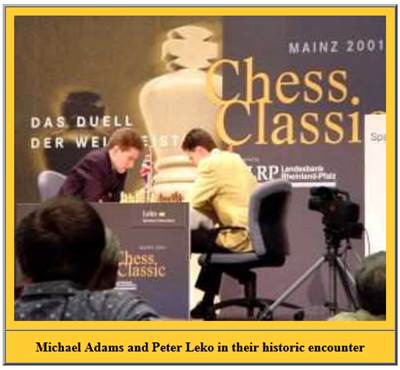
I've already posted a few times on the Leko - Adams match:-
Those references date the match to June 2001, meaning the Geocities pages were written some time after that. The last page in the series (no.6) has a good summary of the situation at the time of the match.
Peter Leko and Michael Adams were chosen as the most logical choices to play for the first Fischer Random title. Both players are in the top five in the January 2001 world rankings joining former and current world champions Kasparov, Anand and Kramnik.
Today, nobody injects more new super novelties to the known theories than Peter Leko. Leko has actually played some Fischer Random games with the inventor of the game himself, Bobby Fischer, who as everyone knows happens to be his friend although he says he prefers to keep the memories to himself.
There's more to explore here, but I ran out of time.
Last year in a post on this blog, The Early Evolution of Fischerandom (February 2021), I listed other posts that had tracked developments in the first half of the 1990s. I wrote,
We see that Fischer's early [chess960] activities were bunched into two time periods. The first period took place in 1992-1993, when Fischer developed the rules of his emerging invention. The second period took place in 1995-1996, when Fischer revealed his invention to the world.
A key event in that period was the announcement of 'Fischerandom' in June 1996. The site that records Fischer newspaper clippings is in fact a family of blogs, where each blog covers a full calendar year. The blog covering 1996, Bobby Fischer 1996, currently consists of only two posts:-
The February 1996 post answered the 'Where Is' question with 'Budapest, Hungary'. It confirms another of my own posts from last year, tracking Fischer's movements from 1992 and afterwards: From Sveti Stefan to Budapest (March 2021).
All of the posts in the family of Fischer blogs include a link to the original clipping. The June 1996 post links to Bobby Fischer Presents New Chess Game (newspapers.com), and adds a transcript of the clipping:-
Buenos Aires, Argentina (AP) -- Former world chess champion Bobby Fischer wants to bring the fun back into chess. To do it, he has created "Fischerandom," a computerized shuffler that randomly distributes chess pieces on the back row of the chess board at the start of each game. That creates 960 possible variations of starting positions -- the first modification to the game in 500 years, the Argentine Chess Club said.
While that appears to be a great start to clippings about the history of chess960, it's the only mention that I could find on the Fischer blogs. I checked all years from 1992, the year of the second Fischer - Spassky match, through 2001, the year of Fischer's most infamous radio broadcasts, and came up empty handed.
I'm looking for a key file (*.CKO) to use with base of games chess 960 with ChessBase 14.
Since the last time I used ChessBase software was, well, never, I first had to decipher the request. What's a *.CKO file?
I already knew that ChessBase management is no fan of chess960; see Purported Problems with Chess960 (April 2018) for the nitty gritty. If that isn't convincing, the user manual for Fritz 18 has a little more than one page out of 425 on Fischer's greatest invention, titled '3.2.10 Chess 960'. The space in front of '960' pretty much guarantees that it will never be found in any normal search. The page instructs you to 'pick a number for one of the predefined Fischer-Random positions', i.e. no built-in random position generator. After that,
Games you have played against the program are saved in the file Autosave-960.cbh in the users folder. Saved Chess 960 games in a database are given with the number of the predefined position with which they were played.
Back to *.CKO files, the best explanation I could find was ChessBase Support - Details : A tip for Full Analysis. It starts,
The function "Full analysis" on Fritz & Co produces a complete analysis of one or several games, including variations, textual commentary and even opening references. The analysis also contains indications of games which were played with that opening system.
For 'indications of games', I understand 'references to games' from another Chessbase database. The explanation continues,
With the help of a large reference database the program is able to classify the opening played in the game, integrate recent games for comparison and indicate the position at which the game being analysed diverges from opening theory.
How does that work?
If no openings key is present in the database you have defined as your reference database, the program cannot produce a reference. [...] If there should be no openings classification, the program automatically offers to classify them by means of a pre-existing key. [...] An openings key always has the file extension *.CKO.
Bingo. A chess960 CKO file would somehow index the 960 start positions. I also found references to a Chessbase CPO file ('positions, openings'). This might serve the same purpose for chess960 as a CKO file, although actionable information on this filetype was even sparser than for the CKO extension.
Will ChessBase someday offer a CKO/CPO solution for chess960? Maybe, but I wouldn't bet any money on it. If the company doesn't see a need to offer a random position at the start of a chess960 game, it won't see a need for more sophisticated functionality.
For many reasons, we don't see too many instructive videos about chess960 -- small expert base, difficult thinking process, small subscriber base -- so any time a good video comes along it's worth featuring.
Here's another video, this time from YouTube's Chess.com channel.
No Human Would Sacrifice These Pieces! (16:35) • '[Published on] Feb 24, 2022'
The description said,
Join NM @James Canty III as he breaks down a thrilling Computer Chess Championship [CCC] Chess960 Blitz game full of sacrifices and tactics between Dragon and Rubi!
I don't agree with everything that NM Canty says about the game, in particular the opening, but I'm not sure I could do any better. Explaining games between top engines is a slippery slope even for world class grandmasters of the human species. As viewers of the same species, we want to be entertained and this video delivers.
A resource from Facebook.com, 'Fischer-Random Chess (Chess960/FRC)', crept into the mix. I'll look at that page another time.
Since there's never a better time than the current time, let's go a little deeper. First, I'll repeat that link, Fischer-Random Chess (Chess960/FRC), which leads to a Facebook group. Most of the 'Discussion' posts consist of links to tournaments on Lichess. I found a notable exception at 'AS Mastur shared a link; 9 March [2022] at 16:33':-
Written by someone who obviously knows a lot about both chess and chess960, the blog post links to HarryO's 'Chess960 Jungle' blog (also on the right sidebar here) and to this 'Chess960 (FRC)' blog. It also introduced me to two resources that I hadn't seen before:-
I'll look at those last two resources another time. Down the rabbit hole once again...
In the post behind that last link, 'A Googly Gadget', I mentioned,
One curiosity I've noticed is that those two reference pages (both on m-w.com) rarely show up in the search results at the same time.
For the last six months, Google has frequently been displaying both reference pages together, as shown in the top portion of the following image (above the '***'). For good measure, it often includes a link to this blog, also shown in the image. Sometimes the three resources are shown bunched together, but in this case a resource from Facebook.com, Fischer-Random Chess (Chess960/FRC), crept into the mix. (I'll look at that page another time.)
For the last month, the two reference pages on m-w.com have reverted to appearing alone, with the other page nowhere to be found. I have no explanation for why this flip-flop occurs.
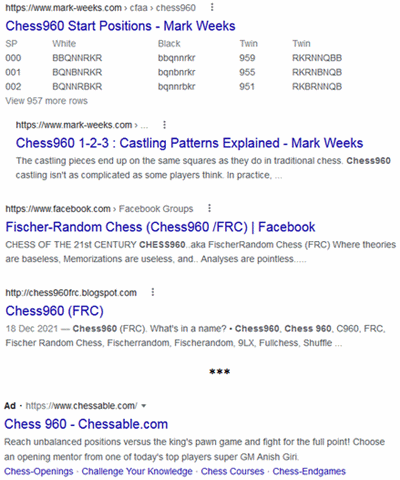
The bottom portion of the image shows an ad that appeared this past week on my weekly search for chess960. The link behind the ad went to Chess 960 - Chessable.com, a not very interesting comment dated 2017. I suppose the real purpose of the ad was to display the four Chessable links under the text snippet, which itself has nothing to do with chess960. Despite this disconnect, it's good to see a major commercial site in online chess bidding on the chess960 keyword. Another old post on this blog also featured a Google ad:-
I doubt that anyone would run that ad -- or a similar ad -- in today's political climate. Putin's invasion of Ukraine strikes too close to any playfulness intended by the ad.
Every once in a while I encounter a reminder about why I no longer enjoy playing SP518. A few days ago it arrived in the February 2022 issue of Chess Life, in a book review titled 'Strong Coffee : GM Gawain Jones stirs the pot with his Coffeehouse Repertoire' by IM John Watson. The review started,
Of late we are seeing numerous opening repertoire books and electronic products by strong players. Most of these recommend variations within a particular White or Black opening, for example, a Caro-Kann Defense repertoire or a tome on "Beating the Sicilian." That’s difficult enough, but a few brave authors have taken on the more ambitious task of presenting a complete repertoire for White from the very first move, or a repertoire for Black versus all of White’s first moves.
You can imagine that with the increasing depth of established theory, such an undertaking has become an extremely daunting one. In his recent Coffeehouse Repertoire books, GM Gawain Jones presents a deep repertoire with 1.e4, and it takes two volumes and 1000 pages to complete the chore.
A thousand pages! Sounds like a lot, but what do I know? The review continued,
These are pages of the dense analytical detail that Quality Chess books are known for, with limited verbal explanation. That might seem excessive, but in fact, Jones can be commended for his efficiency. Quality Chess has already published two even lengthier multi-volume works devoted to repertoires with 1. e4. GM Parimarjan Negi’s brilliant and original five-volume series clocks in at 2280 pages (so far: he hasn’t even written about 1. e4 e5 yet!). And GM John Shaw’s three-volume Playing 1.e4 series consumes 1472 pages.
Finally, I should mention that GM Justin Tan’s recent book 1.e4! The Chess Bible (out from Thinkers Publishing in 2021) takes up the same challenge; so far, his first volume takes up 462 pages, to be followed by two more of presumably similar length. Such books are not for the faint of heart.
Let's summarize that:-
That totals more than 6000 pages ... just 1.e4. I have copies of ECO -- Chess Informant's 'Encyclopedia of Chess Openings' -- that I bought in the 1970s and that I still use occasionally as an easy reference. Here are page counts and year of publication for ECO's five volumes of the first edition:-
That makes less than 2200 pages covering all of White's first moves, starting with ECO A00's 1.h4? and 1.g4? (the '?'s were GM Bent Larsen's evaluation at the time). ECO volumes B and C covered all the 1.e4 responses.
Back to Jones, Negi et al, at whom are these books aimed? IM Watson suggests,
I should make clear that the two volumes of 1. e4 Coffeehouse Repertoire are ideally suited for experienced players or truly dedicated students. Many lower players will find the theoretical demands burdensome, and there’s very little verbal handholding of the "Why am I playing this move?" variety.
No verbal explanations? Sounds like pure engine analysis. As I write this, and as you read it, dozens (hundreds? thousands?) of super strong chess engines are crunching the data on the suggestions made by the four authors, attempting to render their conclusions obsolete and thereby gain a single point (1.0) in a game against their operator's unsuspecting adversary.
This way to the egress! It's clearly marked 'chess960'...
***
NB: None of this is meant to denigrate the efforts of Watson, Jones, Negi et al. John Watson is one of the best chess writers / book reviewers active today. The GMs are just trying to make a buck catering to a niche market while applying their expertise. That's the way it is for SP518 in 2022.
2 : 18 positions
4 : 11
6 : 3
The first column shows the number of times a position was used in a game. In other words, 18 SPs were used twice, and so on. Since each SP was played twice, each engine in turn taking White, this is the minimum. I once attempted to calculate how much each of the 960 SPs were scrambled relative to the traditional start position. The results were summarized in A Chess960 Almanac (October 2011).
Is there a correlation between 'unbalanced books' and the degree of scrambling? A preliminary analysis was inconclusive, but 32 different SPs is too small a sample to decide one way or the other. I hope we'll eventually get enough data to say for sure.
(1) 'Stockfish and LCZero tied for 1st/2nd in the [TCEC] FRC4 'Final League', a point ahead of KomodoDragon. Stockfish beat LCZero +13-9=28 in the Final.'
(2) 'A [TCEC] note mentioned, "!bookfrc • Final League and the Final will use unbalanced books [...] On the edge between draw and white win." For more info, see TCEC FRC 4, under 'FRC Book Generation'.'
(3) 'After FRC4, the site ran an event called 'S22 - DFRC Sanity Check'. What's DFRC? "!dfrc • Double Fischer random chess: The same as Fischer random chess, except the White and Black starting positions do not mirror each other. Double FRC has 921,600 (960*960) possible starting positions."'
The 'more info' reference in (2) was for TCEC FRC 4 - TCEC wiki (wiki.chessdom.org), where the nuts and bolts of the tournament are explained. I covered the previous event in TCEC C960 FRC3 (March 2021).
One welcome difference between FRC3 and FRC4 was the increased number of competitors in the 'First phase', comprised of four leagues. In FRC3, there were four engines in each league; in FRC4, six engines were planned, although only 23 engines started the event. After FRC3, I analyzed engine runtime data for the first time in a pair of posts:-
It might be useful to repeat the exercise for FRC4, although I should be clear on objectives for the exercise. What can be learned by looking at only a small, random subset of the 960 possible start positions?
The TCEC wiki page discusses 'unbalanced books'. It's an interesting concept, but perhaps too heavy on the human manipulation: 'following work is done by hand'; 'then (by hand and eye) I choose'; '[sequences] that don't look crazy to me'; 'eliminated lines that looked too drawish or too busted'; 'some looked too artificial, some looked a bit too similar to others'.
Traditional A/B engines have never been particularly good at evaluating the long term consequences of opening decisions. A comprehensive analysis extends well beyond their search horizons. Maybe the AI NNUE engines are better at this, but that hasn't been studied anywhere (that I know of).
A red flag goes up when I see a phrase like 'lines that looked ... too busted'. In the years of writing about and playing chess960, I haven't seen any start positions that were 'too busted'. To the contrary, Black always has resources to counteract White's various initiatives. Perhaps the researcher behind the analysis (Bastiaan) should make available his full analysis showing which positions were eliminated for which reasons.
Another phrase caught my attention: 'not a single position favours Black in my analysis'. This is what one would expect to see in a position between opponents having exactly the same resources, except one gets to move first. Otherwise we would talk about 'first move disadvantage' or 'zugzwang in the start position'.
As for DFRC (FRC squared? chess921.6K?), this is a new area for analysis. It's another example of Gene Milener's idea that I covered in Chess960 Phase Zero (November 2018). A first action might be to examine runtime data from the DFRC games.